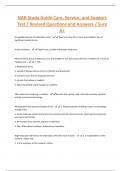NAB Study Guide Care, Service, and Support
Test / Revised Questions and Answers / Sure
A+
Acceptable amount of medication error: - Must not have 5% or more, and residents free of
significant medical errors.
Acute conditions - Rapid onset, curable with proper treatment.
Adverse Events that are defined as one, preventable or not, that caused harm to a resident as a result of
medical care. - 1. Falls
2. Medication Errors
3. spread of disease due to errors in infection and prevention
4. pressure ulcers due to inappropriate care.
5. injuries from abuse or neglect.
6. failure to identify acute changes in condition.
Alternatives to restraining a resident: - Remove from group, walk, talk with someone, physical
activity, environmental change.
Atmosphere's that promote Quality of Life - 1. Physical-pleasant building, rooms, surroundings,
change colors.
2. Social-make eye contact every time see a person and call name and smile. Never ignore any person
you pass in the facility.
3. Be friendly, show warmth, interest in individual.
4. Eden Alternative Loneliness, Helplessness, boredom.
Beginning upon admission, the discharge summaries must include: - 1. a recapitulation of the
resident's entire stay.
2. a final summary of the resident's status.
, 3. Contain a post-discharge plan of care, developed with the participation of the resident, and with the
resident's consent, the resident representatives, which will assist the resident to adjust to his/her new
living arrangement.
4. The resident's disease diagnosis and health conditions, course of illness/treatment or therapy,
medications, and pertinent lab, radiology, consultation results, and instructions or precautions for
ongoing care.
5. The post-discharge plan of care must indicate where the individual plans to reside, any arrangements
that have been made for the resident's follow-up care and any post-discharge medical and non-medical
services.
Behavioral Health Services and there ultimate goal: - The facility must provide the necessary
behavior health care and interventions to attain or maintain the highest practical, physical, mental, and
psychosocial well-being for their residents. The ultimate goal is the prevention and treatment of metal
and substance abuse disorders which in turn allows that person to enjoy the highest quality of life
practical for him/her.
Chronic Conditions - Develop over time, can be treated but not cured.
CMS defines falls as: - 1. An episode where a resident lost his balance and would have fallen, if not
for staff intervention.
2. A fall without injury is still a fall.
3. Unless there is evidence suggesting otherwise, when a resident is found on the floor, a fall has
occurred.
4. CMS gives residents the "right to fall"
Common members found on the Interdisciplinary Team - Depends on resident's overall condition-
RN, MD/DO, Social Worker, Activities Director, Rehab Therapist, Dietitian, CNA.
Dental services must be obtained from outside services that provide: - 1. 24-hour emergency
care-acute pain, damaged tooth.
2. routine inspection, cleaning, filling.
3. prompt referral, appointment, transportation.
4. poor dentition a major factor in malnourishment




